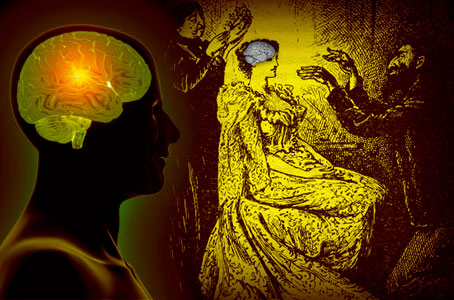Mystery of the Mind
Source: deccanherald.com

From rose-tinted views of childhood to clear recollections of events that never happened, research shows that memories are both suggestible and inherently idealised. Kate Hilpern finds out just how unreliable our powers of recall are.
Oscar Wilde described memory as "the diary that we all carry about", but psychologists increasingly believe that even when our recollections of the past are held with great confidence, emotion and clarity, they can be at best inexact and at worst completely false.
For years, Sonya Wheeler remembered her early primary school days as full of fun. "I used to think about the school's beautiful garden that had a sprinkler, which we all used to run through in fits of giggles," she says.
Recently, however, her mother put her straight. "She said that I had been miserable at that school, that a couple of girls really picked on me. She also said the school didn't have a pretty garden, nor did it have a sprinkler. I think I might have muddled it with a garden of a friend where I used to play years later."
Wheeler's rose-tinted recall is not uncommon. Memories, no matter how distant, generally work in our favour. "Our memories have a superiority complex," says Elizabeth Loftus, professor of psychology and social behaviour at the University of California. "We remember we got better grades than we did, that we voted in elections we didn't vote in, that we gave more money to charity than we did, that our kids walked and talked earlier than they really did. It's not that we're lying. It's just something that happens naturally to allow us to feel a little better about ourselves."
This illusion happens less among people who are depressed. "You could argue that they are sadder, but wiser," says Loftus. Anyone who is horrified at the thought of unwittingly distorting their memories to suit their own ends, she says, should ask themselves: "Would you rather be living with a little bit of fiction or a lot of unhappiness?"
In order to prove the extent to which memories are malleable, Loftus carried out a major study in the 1990s in which participants were asked to read descriptions of events that happened to them as children. Unknown to them, one event was fabricated - a shopping trip when they were five, in which they got lost and were rescued by an elderly person.
So susceptible to the simple but suggestive techniques used by the researchers were some participants that in their memory reports, they talked about the event in detail, with self-assurance and emotion.
You could argue that these people might have genuinely lost their mum in a shop at some point during childhood, but Loftus later carried out similar studies where the fake event was an attack by a vicious animal, witnessing someone being demonically possessed, or being responsible for knocking over a punch bowl at a family wedding and spilling it all over the bride. The results were the same.
Since then, ever more sophisticated studies have taken place, again with similar conclusions. One recently found that when researchers accompanied their suggestive techniques with a related photo, the participant was even more likely to believe a false memory fed to them. This time, the participant was told that they were reprimanded at school for sneaking Slime (the gooey green toy) into their teacher's desk.
Of those subjects who were not given a class photo featuring themselves, 23% formed false memories of the event. But with the photo, the false memory rate soared to 65%.
In one of her latest studies, Kimberley Wade, associate professor in psychology at the University of Warwick, digitally altered childhood photos of participants so that it looked as though they were in a hot-air balloon. The participants were handed the photo. The level of detail with which they created the false memory was astounding.
"I'm still pretty certain it occurred when I was in Year 6 at school - basically for $10 you could go up in a hot-air balloon and go up about 20-odd metres," said one. "I'm pretty sure that Mum is down on the ground taking a photo."
These findings matter, says Wade, not least because some police interrogators use suggestive techniques and images that could lead to illiciting false memories from witnesses and defendants. "We know that some people have been led to believe they committed a crime which they didn't, and have even confessed to it," she says.

A new study, released recently by the University of Portsmouth found that, when asked leading questions, four in 10 people had false memories of the 7/7 London bombings - describing in detail non-existent CCTV footage, such as images of the explosion on the bus in Tavistock Square. Dr James Ost, a psychologist at the University of Portsmouth, said: "Memories are not like a videotape you can rewind and replay for perfect recall. Because of this, memory alone is not reliable enough to form the basis of legal decisions."
Therapists, too, warns Wade, sometimes use stronger suggestive techniques than psychological researchers are allowed to use on ethical grounds. "In my early adolescence, I had early-onset clinical depression that was not picked up," says Sarah Gee. "I had the bad luck of seeing a psychiatrist who believed that something had happened to me. Feeling under pressure, I too began to believe something terrible must have happened," she says.
Later, when Gee was in an adolescent psychiatric unit, this psychiatrist continued to use language that Gee believes was suggestive and that eventually pushed her into making allegations of abuse by family members.
"When I tried to retract what I'd said, I felt I was seen as not being able to deal with the truth. I spent 18 months in foster care," she says.
The National Association for People Abused in Childhood stresses, however, that we should not fall into the trap of seeing recovered memories as inherently false. Planting false memories can also have positive effects, says Wade. "If you lead people to believe they liked healthy food as a child - getting them to 'remember' that they enjoyed asparagus the first time they tried it - that person is likely to go for healthy food when a range of choices is presented to them."
She adds:"There's also research that involved videoing kids with behavioural problems. The more they were exposed to a video in which the bad behaviour was edited out, the more they created memories of being well-behaved and the more they started actually behaving well."
The writer Karl Sabbagh, who is working on a book entitled ‘Remembering Childhood: How Memory Betrays Us’, says that we use memory to score points in our daily lives, which influences our recollections. "We love telling stories in the hope that people will find us interesting," he says. "That in itself is a passive mechanism by which memory gets shaped. It doesn't even need someone to ask leading questions or show photos."
One of the most surprising things of all about memory is that contrary to popular belief, the more specific the detail, the less likely the memory is to be accurate. And while gaps in a memory are generally believed to indicate an unreliable memory, the reality is that gaps are virtually a hallmark of the remembering process.
"People still have this intuitive belief that if someone recounts a memory, it must be true if they display strong emotions," says Cara Laney, lecturer in forensic psychology at the University of Leicester. "But I've been studying memory so long that I don't trust very many of my childhood memories at all."
Article from: http://www.deccanherald.com/Content/
Sep232008/snt2008092291448.asp






















